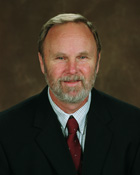Raymond E. Arvidson, Ph.D., the James S. McDonnell Distinguished University Professor, will deliver the inaugural Robert M. Walker Distinguished Lecture at 7 p.m. Oct. 30 in Room 100, Brown Hall.
Arvidson, who has played key roles in NASA’s missions to Mars, including the current Phoenix Mars Mission, will discuss “Mars: Environments, Habitability, and Life” during the free lecture that is open to the public.

Washington University’s McDonnell Center for the Space Sciences is sponsoring the lecture as part of the Robert M. Walker Distinguished Lecture Series in memory of Robert M. Walker, Ph.D., the center’s inaugural director from 1975-1999. He continued to be active with the center until his death in 2004.
Walker was a pioneering physicist who played a decisive role in shaping research in the space sciences, not only at the University, but also worldwide, according to Ramanath Cowsik, Ph.D., the center’s current director.
The McDonnell Center, which was established in 1975 through a gift from the aerospace pioneer James S. McDonnell, is a consortium of WUSTL faculty, research staff and students coming primarily from the Arts & Sciences departments of Earth & Planetary Sciences and Physics who are working on the cutting edge of space research.
“The center’s activities have projected Washington University as a leading institution for research in a wide range of fields like gravitation, cosmology, modern astronomy and planetary sciences,” said Cowsik, a professor of physics.
“Bob brought in talented scientists like Ray Arvidson and Larry Haskin and worked with them closely to transform the erstwhile geology department into the Department of Earth & Planetary Sciences, with a substantial space research component,” continued Cowsik. “Thus it was felt appropriate to establish an annual lecture commemorating Bob’s contributions.
“The choice of the inaugural speaker was instantly clear — Professor Raymond E. Arvidson, who has worked so closely with Bob in making Washington University one of the leaders in space sciences. His own credentials are impeccable — an eminent scientist, much decorated with awards and distinctions and currently leading the exploration of Mars to find evidence for water on that planet — a necessary component for life and habitation,” added Cowsik.

Arvidson will also deliver a colloquium, titled “The Mars Phoenix Lander Mission: A Story of Soil and Ice,” as part of the lecture series at 4 p.m. Oct. 29 in Room 204, Crow Hall. A coffee reception will be held at 3:30 p.m. in Room 245 of Compton Hall. Both are free and open to the public as well.
“The international exploration of Mars has focused during the past two decades on understanding the planet and its history, with an emphasis on current and past climates and implications for habitability and life,” says Arvidson, who is a Phoenix Science Operations lead.
The Phoenix Lander successfully touched down on a high northern latitude site on Mars on May 25, 2008, and began imaging the surface, trenching and acquiring soil and water ice samples for on-board analyses, and acquiring meteorological observations in coordination with Mars Reconnaissance Orbiter measurements.
“During both talks, we will cover the evidence that ancient Mars had rivers and lakes and that the planet became increasingly arid and cold,” said Arvidson. “Implications for environmental conditions conducive to the origin and evolution of life will be discussed and we will speculate on where to explore for evidence that Mars once supported life.”
Arvidson is also is co-investigator for the Phoenix robotic arm, a crucial instrument that is gathering the soil and ice samples; lead for archiving mission data; and chair of the Phoenix landing site working group.
He participated in the two Viking Lander missions in 1976, helped select the landing site for the 2004 Mars Exploration Rover mission, and then guided the activities of the rovers Spirit and Opportunity as the mission’s deputy principal investigator.
Pioneering physicist
Walker, who joined the University in 1966 as the first McDonnell Professor of Physics and director of a new Laboratory for Space Sciences, worked on the frontiers of space research for more than four decades.
In the early 1960s, Walker’s discovery of fossil nuclear particle tracks in minerals was instrumental to new developments in geochronology and cosmic ray physics. In particular, his discovery of tracks from nuclei heavier than iron opened a new frontier of cosmic ray physics. He subsequently pioneered the use of plastics to detect and count such nuclei in cosmic ray balloon flights.
Walker played a key role in planning the return of samples by the Apollo missions and in pathbreaking laboratory studies of “moon rocks.” He also was a world leader in the past two decades of microanalytical studies of tiny grains preserved for eons in meteorites, culminating in their identification as stardust.
For more information on the talks, contact Jan Foster at 935-5332 or janf@physics.wustl.edu.